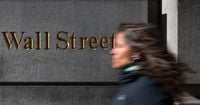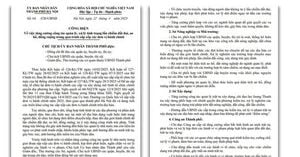The recent fluctuations in the U.S. stock market have sparked a mix of optimism and caution among investors, as signs of a potential de-escalation in the ongoing U.S.-China trade war emerge. On April 23, 2025, the S&P 500 U.S. stock index surged to a two-week high, buoyed by hopes that the escalating tariff tensions between the two countries might be easing. President Donald Trump’s recent remarks, signaling a softer approach towards Federal Reserve Chair Jerome Powell, have further fueled this positive sentiment.
According to a report by the Wall Street Journal, a senior White House official indicated that U.S. tariffs on China could be reduced to between 50% and 60%. This news comes as a relief to many investors who have been grappling with the uncertainty surrounding trade policies. The market's reaction has been swift; stocks have begun to recover from recent lows, suggesting that investors are cautiously optimistic about the future.
Late on April 22, Trump stated he had "no intention" of firing Powell, a comment that reversed last week’s unsettling remarks where he suggested Powell’s termination could not come "fast enough." This shift in tone has helped to alleviate some of the anxiety that had gripped the markets, as investors feared instability within the Federal Reserve could exacerbate economic challenges.
Russell Price, Chief Economist at Ameriprise, noted, "With those worst-case scenarios, for the most part, seeming to be taken off the table, stocks have reason to rise somewhat off of their bottoms." He emphasized the importance of resolving trade tensions quickly to prevent long-term negative perceptions of the U.S. economy on a global scale.
However, the optimism is tempered by concerns over the long-term implications of the current economic climate. The Federal Reserve's recent report indicated that prices are rising and economic activity is beginning to slow across various sectors, as businesses and households struggle to adapt to Trump's unpredictable tariff policies. This erratic rollout of tariffs has left many questioning the sustainability of the current market rally.
Amelie Derambure, a Senior Multi-Asset Portfolio Manager at Amundi in Paris, remarked, "Markets are really hoping that the worst will not happen and are really giving a chance to negotiations and less tariffs being implemented." This sentiment reflects a broader hope among investors that negotiations will yield positive outcomes, allowing for a more stable economic environment.
Peter Cardillo, Chief Market Economist at Spartan Capital Securities in New York, echoed this sentiment, stating, "There seems to be some light at the end of the tunnel here in terms of the trade war." He believes that investors are beginning to feel more confident, suggesting that the worst of the trade rhetoric may be behind us.
Despite the recent rally, some analysts caution that the market's response may be short-lived. Peter Andersen, Founder of Andersen Capital Management in Boston, noted, "Unless the President or the administration comes out with consistent statements... this is a temporary rally." He pointed out that the market reacts quickly to news, both good and bad, and that sustained confidence will require more than just fleeting reassurances from the administration.
The current market dynamics are also characterized by a significant amount of policy uncertainty. Analysts point to the ongoing tariff and trade issues as primary factors influencing market behavior. As the situation evolves, investors remain watchful, hoping for clarity and stability in both trade policies and Federal Reserve actions.
In the midst of this uncertainty, Walmart has emerged as a notable beneficiary of the current bull market in equities. The retail giant's size and stability have attracted investors seeking a safe haven, even as its growth remains relatively slow. However, some market observers caution that Walmart's stock may be overvalued, highlighting the fault lines developing as a result of Trump's economic strategies.
The complexities of the current economic landscape are underscored by the contrasting perspectives on the potential for recession. While some analysts maintain an optimistic outlook, expecting that a recession could be avoided with successful negotiations, others remain skeptical. The author of a recent article expressed a personal expectation of a recession, reflecting the prevailing uncertainty that continues to cloud the economic horizon.
As the market reacts to these developments, the interplay between U.S.-China relations, Federal Reserve policies, and domestic economic conditions will be crucial in shaping the future. Investors will be closely monitoring the administration's next moves, hoping for a resolution that fosters confidence and stability in the markets.
In summary, while the stock market has shown signs of recovery, the underlying factors driving these changes highlight the precarious nature of the current economic environment. With trade negotiations and Federal Reserve policies at the forefront, the coming weeks will be pivotal in determining whether this rally is a sign of lasting recovery or merely a temporary blip in an uncertain economic landscape.




